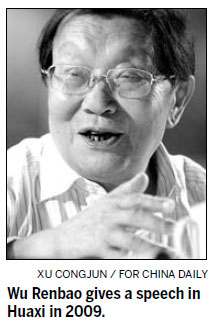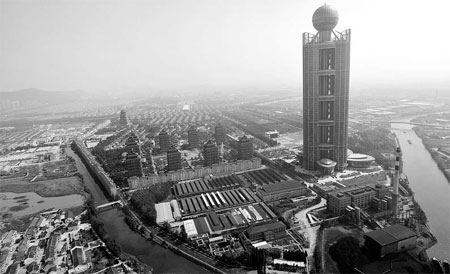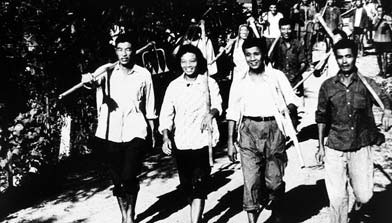Village mourns visionary former chief
Updated: 2013-03-20 07:15
By Cang Wei in Jiangyin, Jiangsu and Song Wenwei in Nanjing (China Daily)
|
||||||||
|
An aerial photo of Huaxi village in October 2011. Sun Can / Xinhua |
|
Wu Renbao (second from right), then chief of Huaxi in Jiangsu province, walks with villagers on their way to do farm work in June 1968. Chen Baojin / Xinhua |

People in one of China's richest villages are in deep mourning for their former chief, Wu Renbao, who died of lung cancer on Monday afternoon.
Wu, 85, died at 6:58 pm at his home in Huaxi village of Jiangyin, Jiangsu province. The village is well known in China for its wealth and common prosperity.
In the memorial hall where Wu's body has been placed for mourners to pay homage, many villagers wailed, with tears streaming down their faces.
"I've cried several times since I heard about the death of Wu," said villager Wang Fumei. "Though he had been ill for a long time and the villagers were prepared for the upcoming sad news, many of us still could not face it when it really came."
"He's a man of the Huaxi people," said villager Zhao Zhongxiang. "Without him the village would not have become what it is today."
Since Wu's death, the lights of Huaxi's landmark - a 328-meter-high five-star hotel, have been turned off in the evening to pay respect to him.
Many local people wore black armbands and hurried to the memorial hall to pay their last respects.
The official memorial ceremony, organized by the city government of Jiangyin, will be held at 8:08 am on Friday morning, according to Sun Haiyan, deputy Party chief of Huaxi.
"To comply with Wu's wishes, no more memorial activities will be held except the official memorial ceremony," said Sun.
Huaxi's sales revenue reached 52.45 billion yuan ($8.44 billion) in 2012, according to Sun.
Huaxi, which covers 35 square kilometers and is home to 35,000 people, was developed from a poor village that occupied only 0.96 sq km. Its collective assets, when it was founded in 1961, were worth just 25,000 yuan.
"Now the 2,000 registered residents of the village all live in villas, have luxury cars and each has an average deposit of at least 1 million yuan," said Sun.
The villagers also receive stock options and bonuses, free healthcare, and enjoy free domestic or foreign travel.
In 2010, Huaxi villagers' average annual income reached 85,000 yuan, while the figure for Shanghai citizens was 32,000 yuan.
Wu had been the chief of Huaxi since the 1950s. His fourth son Wu Xie'en took the helm in November 2002.
In the 1960s and 1970s, when other villages in China were focusing on farming, Wu talked villagers into running a metal processing plant to make money.
In 1978, when China initiated the reform and opening-up policy, Wu suggested the villagers invest their portion of the year-end bonus in village-owned factories.
In the 1980s, following the introduction of the household contract responsibility system in rural China, Wu kept the village's land as a collective asset to establish steel and textile factories, from which the village has benefited for years.
But some of Wu's high-profile behavior also sparked controversy, including showing off the village's wealth and the centralization of power among Wu's family.
The 328-meter hotel, which cost 3 billion yuan to build, has 16 presidential suites, 800 standard rooms and luxury clubs decorated in pure gold and silver. In the lobby of the hotel stands a golden bull sculpture made of 1 metric ton of gold.
On Nov 28 the village opened its 10,000-sq-m museum that consists of replicas of palaces from Beijing's Forbidden City. It houses tens of thousands of artworks created by famous artists.
In recent years, each villager has been given gold bullion as gifts during Spring Festival.
It was reported by China Entrepreneur Magazine's news website iceo.com.cn that Wu's four sons can dispose 90.7 percent of the village's funding, and that 36 of the around 50 leaders of Huaxi's Party committee are closely connected with Wu's family.
"The way is correct as long as it makes the villagers rich," Wu was once quoted by 21st Century Business Herald as saying in response to the controversies.
"He didn't rest for a single day after retirement," said Wu Xie'en, current chief of the village. "As his offspring, our way of showing filial piety is to respect his desire to work."
Contact the writers at cangwei@chinadaily.com.cn and songwenwei@chinadaily.com.cn
(China Daily 03/20/2013 page5)

 In Photos: 7.0-magnitude quake hits Sichuan
In Photos: 7.0-magnitude quake hits Sichuan
 Li Na on Time cover, makes influential 100 list
Li Na on Time cover, makes influential 100 list
 FBI releases photos of 2 Boston bombings suspects
FBI releases photos of 2 Boston bombings suspects
 World's wackiest hairstyles
World's wackiest hairstyles
 Sandstorms strike Northwest China
Sandstorms strike Northwest China
 Never-seen photos of Madonna on display
Never-seen photos of Madonna on display
 H7N9 outbreak linked to waterfowl migration
H7N9 outbreak linked to waterfowl migration
 Dozens feared dead in Texas plant blast
Dozens feared dead in Texas plant blast
Most Viewed
Editor's Picks

|

|

|

|

|

|
Today's Top News
Live report: 7.0-magnitude quake hits Sichuan, heavy casualties feared
Boston suspect cornered on boat
Cross-talk artist helps to spread the word
'Green' awareness levels drop in Beijing
Palace Museum spruces up
First couple on Time's list of most influential
H7N9 flu transmission studied
Trading channels 'need to broaden'
US Weekly

|

|









